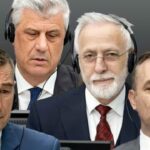The re-election of Emmanuel Macron should also be understood as a democratic response to Russia’s attack on Europe and a message for the further development of the European project, writes Frank Hofmann.
The result for the surprise is very clear : Nearly 60% of French people voted for Emmanuel Macron again, but especially they showed the limit to the radical right-wing rival, Marine Le Pen who won just over 40% of the vote. But Le Pen will remain in politics, and with it the demands, that France leave NATO and the European Union be blocked.
The French parliament is re-elected in June. And the results in the first round of the presidential election two weeks ago – a third of the vote for the far right and about 20% of the vote for the left-wing populist Jean-Luc Mélenchon make it clear: The French want something radically changed . Paris, the capital and its political class have long been very unpopular in the French regions. But now the feeling of frustration “they up there, we down here” is manifested in the critique of democracy as a whole. And this is more than a warning signal.
The EU should be perceived as a protective community
For the past five years the movement created first by Macron and later as the La République en Marche party has exacerbated the democratic deficit by ousting political camps known as the Left Socialists on the one hand and the Conservatives on the other. This must be changed by Macron and his party, so that France does not plunge into extremist nationalism.
This is about Europe and its most important partner, Germany. The European Union is perceived in France as a club for big concerns and not as a patronizing community at home and abroad. For two months the Russian attack on Ukraine shows that many people are right with this assessment. The Russian attack is also an attack on a free and democratic Europe.
Five years ago Macron was elected with a clear political agenda for Europe, prepared by Clement Beaune, meanwhile Secretary of State for Europe at the French Foreign Ministry. The 40-year-old has shown Macron only 4 years more than what needs to be done in the EU – deeper EU integration and democratization.
But so far Brussels has not yet been able to make majority decisions on EU foreign policy issues. Absurd: Putin’s friend and illiberal Hungarian prime minister Viktor Orban could veto important decisions – at a time when Russia is attacking democracy in Europe with guns, French and German taxpayers must fund the EU’s biggest opponent within its ranks. So think many French people.
Now it’s Berlin’s turn
The election result in France is therefore a second chance for Europe, and especially for Germany. For more than five years, Macron has called for the European Union to stabilize as the world’s most powerful bloc between the two powers, the United States and China, with a strong German-French element. Former German Chancellor Angela Merkel did not want to follow this proposal. Former Chancellor Merkel’s European political legacy contains a disastrous balance sheet of EU integration, compared to chancellors like Helmut Kohl and Helmut Schmidt. Macron’s ideas for further deepening of integration between the two countries, Merkel responded only with a half-hearted renewal of the German-French agreement.
The current government of the SPD, the Greens and the FDP in Berlin has the opportunity to correct this mistake. The mediators of the Greens / Alliance 90 cleverly incorporated the strengthening of the EU into the coalition agreement. Not like the SPD before with a pathetic chapter for Europe, but with concrete proposals in many policy directions that lead to a major step towards turning Europe into a community of united European states. That’s what it’s all about now. Since Sunday the ball has passed on the Berlin side./DW






